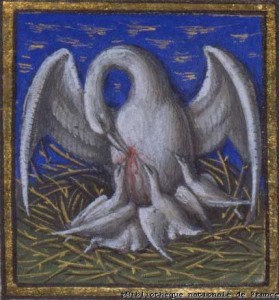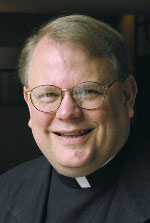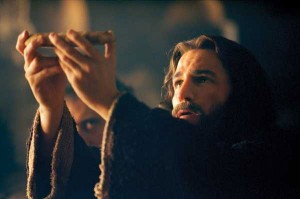from Vatican Radio:
Did you know that the Feast of Corpus Christi was established during Saint Thomas’s lifetime? And that he probably wrote many of the prayers we use in the liturgy on this feast as well as some fine hymns in honour of the Blessed Sacrament.
But what is the connection with the pelican biting its breast , releasing drops of blood, to feed the young?
A programme presented by Monsignor Philip Whitmore and produced by Veronica Scarisbrick.
Tags: catholic, catholic podcast, catholic prayer, cathollc spirituality, corpus christi, feast of corpus christi, meditation, Monsignor Philip Whitmore, Saint Thomas, vatican radio, Veronica Scarisbrick
This entry was posted on Thursday, June 7th, 2012 at 12:11 am
You can follow any responses to this entry through the RSS 2.0 feed.
What is the “Roman Canon”?  Fr. Milton Walsh helps us to answer that question and enter deeply into the mystery found in this beautiful Eucharistic prayer.  Drawing from the best of biblical and liturgical scholarship, Fr. Walsh offers a beautiful 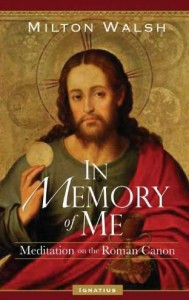 meditation that can help priests, religious, and laity deepen their understanding of the text that for centuries was the only Eucharistic prayer used in the Roman Rite.  This is a great book to give those in Catholic Adult Formation programs, like the RCIA, Diaconate training, Religious Education Catechist, as well as to the average “pew person” who longs for a deeper encounter in the depths of our Sacred Liturgy.
meditation that can help priests, religious, and laity deepen their understanding of the text that for centuries was the only Eucharistic prayer used in the Roman Rite.  This is a great book to give those in Catholic Adult Formation programs, like the RCIA, Diaconate training, Religious Education Catechist, as well as to the average “pew person” who longs for a deeper encounter in the depths of our Sacred Liturgy.
[powerpress]
You can Fr. Walsh’s book here
With a revised English translation of the venerable Roman Canon, many Catholics will be hearing it with new ears. This book will help them hear it with a new heart. Don’t just study the new words, step into the soul of Eucharistic Prayer I. —Rev. Paul Turner, Former president of the North American Academy of Liturgy
Tags: catholic, catholic podcast, catholic prayer, cathollc spirituality
This entry was posted on Friday, January 13th, 2012 at 9:01 am
You can follow any responses to this entry through the RSS 2.0 feed.
 VATICAN CITY, 11 JAN 2012 (VIS) 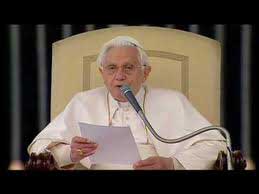
Jesus’ prayer during the Last Supper was the theme of Benedict XVI’s catechesis during his general audience, which was held this morning in the Paul VI Hall in the presence of 4,000 faithful.
The Pope explained how the emotional backdrop to the Last Supper, in which Jesus bade farewell to His friends, was the immanence of His approaching death. Moreover, in the days in which He was preparing to leave His disciples, the life of the Jewish people was marked by the approaching Passover, the commemoration of the liberation of Israel from Egypt.”It was in this context that the Last Supper took place”, the Holy Father said, “but with an important novelty”. Jesus “wanted the Supper with His disciples to be something special, different from other gatherings. It was His Supper, in which He gave something completely new: Himself. Thus Jesus celebrated the Passover as an anticipation of His Cross and Resurrection”.
The essence of the Last Supper lay in “the gestures of breaking and distributing the bread, and sharing the cup of wine, with the words that accompanied them and the context of prayer in which they took place. This was the institution of the Eucharist: the great prayer of Jesus and the Church”. The words the Evangelists use to describe that moment “recall the Jewish ‘berakha’; that is, the great prayer of thanksgiving and blessing which, in the tradition of Israel, is used to inaugurate important ceremonies. … That prayer of praise and thanks rises up to God and returns as a blessing. … The words of the institution of the Eucharist were pronounced in this context of prayer. The praise and thanksgiving of the ‘berakha’ became blessing and transformed the bread and wine into the Body and Blood of Jesus”.
Jesus’ gestures were the traditional gestures of hospitality which a host would extend to his guests, but in the Last Supper they acquired a more profound significance, Pope Benedict explained. Christ provided “a visible sign of welcome to the table upon which God gives Himself. In the bread and the wine, Jesus offered and communicated His own Self”. Aware of His approaching death, “He offered in advance the life that would shortly be taken from Him, thus transforming His violent death into a free act of the giving of Self, for others and to others. The violence He suffered became an active, free and redemptive sacrifice”.
“In contemplating Jesus’ words and gestures that night, we can clearly see that it was in His intimate and constant relationship with the Father that He accomplished the gesture of leaving to His followers, and to all of us, the Sacrament of love”, said the Pope. During the Last Supper Jesus also prayed for His disciples, who likewise had to suffer harsh trials. With that prayer “He supported them in their weakness, their difficulty in understanding that the way of God had to pass through the Paschal mystery of death and resurrection, which was anticipated in the offer of bread and wine. The Eucharist is the food of pilgrims, a source of strength also for those who are tired, weary and disoriented”.
Benedict XVI went on: “By participating in the Eucharist we have an extraordinary experience of the prayer which Jesus made, and continues to make for us all, that the evil we encounter in our lives may not triumph, and that the transforming power of Christ’s death and resurrection may act within each of us. In the Eucharist the Church responds to Jesus’ command to ‘do this in remembrance of me’, she repeats the prayer of thanksgiving and blessing and, therewith, the words of transubstantiation of the bread and wine into the Body and Blood of the Lord.
Our Eucharistic celebrations draw us into that moment of prayer, uniting us ever and anew to the prayer of Jesus”.
“Let us ask the Lord that, after due preparation also with the Sacrament of Penance, our participation in the Eucharist, which is indispensable for Christian life, may always remain the apex of all our prayers”, the Pope concluded. “Let us ask that, profoundly united in His offering to the Father, we too can transform our crosses into a free and responsible sacrifice of love, for God and for our fellows”.
At the end of his catechesis the Holy Father delivered greetings in a number of languages to the pilgrims present in the Paul VI Hall, inviting them to participate with
“faith and devotion” in the Eucharist which, he said, is indispensable for Christian life as well as being the school and culmination of prayer. Addressing young people, the sick and newlyweds, he pointed our that last Sunday’s Solemnity of the Baptism of the Lord is an occasion to reflect upon our own Baptism. “
Dear young people”, the Pope exclaimed, “live your membership of the Church, the family of Christ, joyfully. Dear sick people, may the grace of Baptism ease your sufferings and encourage you to offer them to Christ for the salvation of humanity. And you, dear newlyweds, … base your marriage on the faith which you received as a gift on the day of your Baptism”.
AG/Â Â Â Â Â Â Â Â Â Â Â Â Â Â Â Â Â Â Â Â Â Â Â Â Â Â Â VIS 20120111 (880) (more…)
Tags: catholic, catholic podcast, catholic prayer, cathollc spirituality, eucharist, last supper, lord's supper, prayer
This entry was posted on Thursday, January 12th, 2012 at 9:30 am
You can follow any responses to this entry through the RSS 2.0 feed.
The New and Eternal Word, Monsignor James P. Moroney explores how the Church celebrates the Holy Mass in our day. In particular, he examines how a new Missale Romanum and a new English translation of these prayers can draw us more deeply into the words and rites of the Mass.
Tags: catholic, catholic podcast, catholic prayer, cathollc spirituality, eternal word, Monsignor James P. Moroney, Msgr. James P. Moroney, new mass translation
This entry was posted on Wednesday, December 7th, 2011 at 12:19 am
You can follow any responses to this entry through the RSS 2.0 feed.
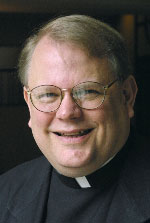 In this episode, Monsignor Moroney answers the question, where does the Mass come from?
In this episode, Monsignor Moroney answers the question, where does the Mass come from?
The New and Eternal Word, Monsignor James P. Moroney explores how the Church celebrates the Holy Mass in our day. In particular, he examines how a new Missale Romanum and a new English translation of these prayers can draw us more deeply into the words and rites of the Mass.
Tags: catholic, catholic podcast, catholic prayer, cathollc spirituality, eternal word, Monsignor James P. Moroney, Monsignor Moroney, new mass translation
This entry was posted on Wednesday, November 30th, 2011 at 12:07 am
You can follow any responses to this entry through the RSS 2.0 feed.
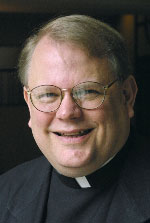 Monsignor James P. Moroney introduces to us the Collect for the First Sunday of Advent (from the new English translation of the Roman Missal, Third Typical Edition).
Monsignor James P. Moroney introduces to us the Collect for the First Sunday of Advent (from the new English translation of the Roman Missal, Third Typical Edition).
The last part of the introductory rites is the Collect prayer, or what is commonly referred to as the opening prayer. In the early Church, this prayer probably served to gather the assembly for worship, but now it serves to collect or focus the assembly’s prayer at the beginning of the liturgy.
The Collect is a carefully constructed prayer and can be broken down into several parts: the priest’s invitation to prayer, “Let us pray;” a brief period of silence for private prayer and recalling one’s own intention; the prayer itself (containing praise of God, a petition, and the hoped outcome for the petition); a concluding doxology, “Through Christ our Lord;” and the people’s response, “Amen.”
All of the Collect prayers have been retranslated in a way that more accurately captures their original structure and meaning in Latin. Obviously, some of the literary devices such as rhyme and word play, among others, will not shine through as they do in the Latin, and some of the sentences are long and complex. However, the words matter; the words articulate the truths of the Christian faith. The words shape and form us as a believing community, and the words contribute to the unity of the Church across the world.
Tags: catholic, catholic podcast, catholic prayer, cathollc spirituality, first sunday of advent, Monsignor James P. Moroney, new translation
This entry was posted on Sunday, November 27th, 2011 at 9:32 am
You can follow any responses to this entry through the RSS 2.0 feed.
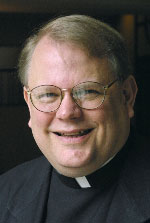 In this episode “Ars Celebrandi”, he explains how we are praying the Mass from the inside out.
In this episode “Ars Celebrandi”, he explains how we are praying the Mass from the inside out.
The New and Eternal Word, Monsignor James P. Moroney explores how the Church celebrates the Holy Mass in our day. In particular, he examines how a new Missale Romanum and a new English translation of these prayers can draw us more deeply into the words and rites of the Mass.
Tags: catholic, catholic podcast, catholic prayer, cathollc spirituality, Monsignor James P. Moroney, new mass translation
This entry was posted on Friday, November 25th, 2011 at 8:55 am
You can follow any responses to this entry through the RSS 2.0 feed.
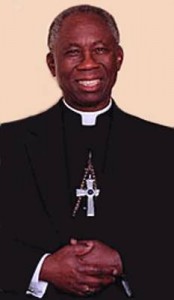 Cardinal Arinze, on September 21, 2011, spoke with priests of the Archdiocese of Omaha on the Sacred Liturgy of the Church and unique and specific role of the priest.
Cardinal Arinze, on September 21, 2011, spoke with priests of the Archdiocese of Omaha on the Sacred Liturgy of the Church and unique and specific role of the priest.
[powerpress]
Francis Cardinal Arinze discussed the Sacred Liturgy as central to the life and ministry of the priest.  He discusses what the Sacred Liturgy is,  he summarizes the ministry of the priest in its three-fold aspect and then sets out how the Sacred Liturgy effects the personal life of the priest.  How he celebrates it matters very much.
This is a very important prospective for all the members of the Church to hear!
Event sponsored by the Pro Sanctity Movement
Tags: Cardinal Arinze, catholic, catholic podcast, catholic prayer, cathollc spirituality, sacred liturgy, the Sacred Liturgy
This entry was posted on Thursday, October 27th, 2011 at 3:23 pm
You can follow any responses to this entry through the RSS 2.0 feed.
Word for Word [Edge] from Life Teen on Vimeo.
Tags: catholic, catholic podcast, catholic prayer, cathollc spirituality, life teen, the mass
This entry was posted on Thursday, August 18th, 2011 at 10:36 am
You can follow any responses to this entry through the RSS 2.0 feed.
“Our One Great Act of Fidelity:  Waiting for Christ in the Eucharist” is a wonderful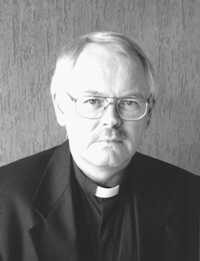 reflection on the many aspects the Eucharist touches our hearts and our lives.  I have read Fr. Ronald Rolheiser for many years in our local diocesans newspaper…what a delight to finally have the opportunity to speak to him, especially about this deeply personal book which  is not only
reflection on the many aspects the Eucharist touches our hearts and our lives.  I have read Fr. Ronald Rolheiser for many years in our local diocesans newspaper…what a delight to finally have the opportunity to speak to him, especially about this deeply personal book which  is not only 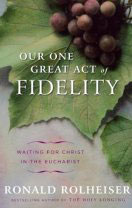 offers theological insights, but is a also spiritual and a personal statement of how Fr. Rolheiser understands the Eucharist and why he celebrates it every day.
offers theological insights, but is a also spiritual and a personal statement of how Fr. Rolheiser understands the Eucharist and why he celebrates it every day.
[powerpress]
You can find Fr. Rolheiser’s book here
Tags: catholic, catholic podcast, catholic prayer, cathollc spirituality
This entry was posted on Monday, July 11th, 2011 at 12:19 am
You can follow any responses to this entry through the RSS 2.0 feed.
Tags: catholic, catholic podcast, catholic prayer, cathollc spirituality, st thomas aquinas
This entry was posted on Sunday, June 26th, 2011 at 11:55 am
You can follow any responses to this entry through the RSS 2.0 feed.
When you listen to Mike Aquilina express the mystery and beauty of the Eucharist, you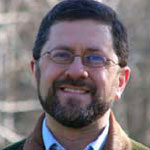 know it is truly coming from someone who has been deeply touched in his depths of his own heart by this tremendous sacrament of love. I love talking with Mike, he strengthens and encourages my own faith so much…he is such a gift to the body of Christ!  In “The Fire of God’s Love” he passes on insights on the Eucharist to inspire us all.  Saints and popes are represented in this collection, but also reflections from folks representing in our own time, like J.R.R. Tolkien,
know it is truly coming from someone who has been deeply touched in his depths of his own heart by this tremendous sacrament of love. I love talking with Mike, he strengthens and encourages my own faith so much…he is such a gift to the body of Christ!  In “The Fire of God’s Love” he passes on insights on the Eucharist to inspire us all.  Saints and popes are represented in this collection, but also reflections from folks representing in our own time, like J.R.R. Tolkien, 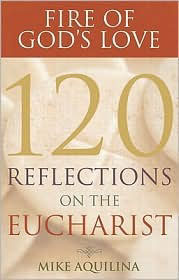 Maria Montessori, Conrad Hilton, and George Wiegel.
Maria Montessori, Conrad Hilton, and George Wiegel.
[powerpress]
Tags: catholic, catholic podcast, catholic prayer, cathollc spirituality, eucharist, eucharistic devotion, holy eucharist, Mike Aquilina More, st. anthony messenger books, st. paul center for biblical theology
This entry was posted on Sunday, June 26th, 2011 at 8:16 am
You can follow any responses to this entry through the RSS 2.0 feed.
Tags: catholic, catholic podcast, catholic prayer, cathollc spirituality, classical music, feast of corpus christi, mozart, sacred music, st thomas aquinas
This entry was posted on Sunday, June 26th, 2011 at 12:19 am
You can follow any responses to this entry through the RSS 2.0 feed.
Episode 18 -The Way of Mystery: The Eucharist and Moral Living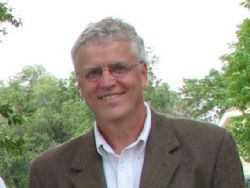 – The Final installment of the series. The challenge of living the moral life and the gift of grace from the sacrament of the Eucharist.
– The Final installment of the series. The challenge of living the moral life and the gift of grace from the sacrament of the Eucharist.
[powerpress]
Deacon James Keating, PhD, the director of Theological Formation for the Institute for Priestly Formation, located at Creighton University, in Omaha, is making available to â€Discerning Hearts†and all who listen, his series of programs entitled “The Way of Mysteryâ€.
 The Vatican II documents remind us that the spiritual journey is not made in a vacuum, that God has chosen to save us, not individually, but as The People of God. The Eucharist must help Christians to make their choices by discerning out of Christ’s paschal mystery. For this process to take place, however, Christians must first understand how the Eucharist puts them in touch with Christ’s passion, death, and resurrection, and what concrete implications being in touch with this mystery has for their daily lives.
The Vatican II documents remind us that the spiritual journey is not made in a vacuum, that God has chosen to save us, not individually, but as The People of God. The Eucharist must help Christians to make their choices by discerning out of Christ’s paschal mystery. For this process to take place, however, Christians must first understand how the Eucharist puts them in touch with Christ’s passion, death, and resurrection, and what concrete implications being in touch with this mystery has for their daily lives.
For more information on the “Institute of Priestly Formation†and for other material available by Deacon Keating, just click here
Don’t forget to pickup a copy of “Communion with Christ†, it is one of the best audio sets on prayer…ever!
Check out Deacon Keating’s “Discerning Heart†page
Tags: catholic, catholic podcast, catholic prayer, cathollc spirituality, creighton university, Deacon James Keating, institute for priestly formation, james keating, paschal mystery, sacrament of the eucharist, the eucharist, theological formation
This entry was posted on Thursday, May 5th, 2011 at 2:26 pm
You can follow any responses to this entry through the RSS 2.0 feed.
Episode 15 -The Way of Mystery: The Eucharist and Moral Living– The journey begins into the unitive way…the beginning of falling in love with God. Combined with the entry into the sacramental life, the living out the moral life becomes more than meeting a “goal”, but becomes a “way” of life.
falling in love with God. Combined with the entry into the sacramental life, the living out the moral life becomes more than meeting a “goal”, but becomes a “way” of life.
[powerpress]
Deacon James Keating, PhD, the director of Theological Formation for the Institute for Priestly Formation, located at Creighton University, in Omaha, is making available to â€Discerning Hearts†and all who listen, his series of programs entitled “The Way of Mysteryâ€.
 The Vatican II documents remind us that the spiritual journey is not made in a vacuum, that God has chosen to save us, not individually, but as The People of God. The Eucharist must help Christians to make their choices by discerning out of Christ’s paschal mystery. For this process to take place, however, Christians must first understand how the Eucharist puts them in touch with Christ’s passion, death, and resurrection, and what concrete implications being in touch with this mystery has for their daily lives.
The Vatican II documents remind us that the spiritual journey is not made in a vacuum, that God has chosen to save us, not individually, but as The People of God. The Eucharist must help Christians to make their choices by discerning out of Christ’s paschal mystery. For this process to take place, however, Christians must first understand how the Eucharist puts them in touch with Christ’s passion, death, and resurrection, and what concrete implications being in touch with this mystery has for their daily lives.
For more information on the “Institute of Priestly Formation†and for other material available by Deacon Keating, just click here
Don’t forget to pickup a copy of “Communion with Christ†, it is one of the best audio sets on prayer…ever!
Check out Deacon Keating’s “Discerning Heart†page
Tags: catholic, catholic podcast, catholic prayer, cathollc spirituality, creighton university, Deacon James Keating, institute for priestly formation, moral life, paschal mystery, sacramental life, spiritual journey, the eucharist, the unitive way, theological formation, way of mystery
This entry was posted on Saturday, February 26th, 2011 at 8:08 am
You can follow any responses to this entry through the RSS 2.0 feed.

